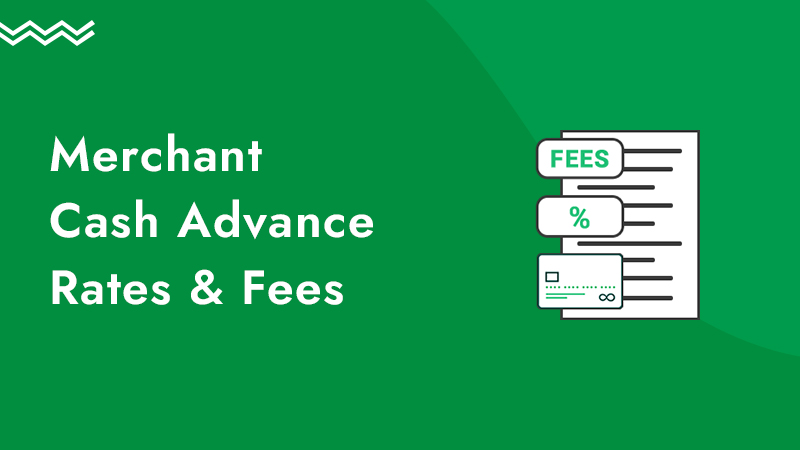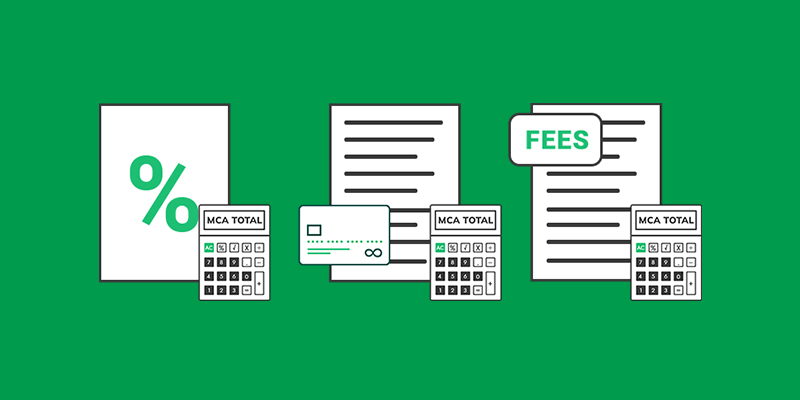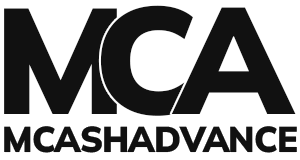
Merchant cash advance rates (MCA rates) can be difficult to calculate, especially when compared to traditional business loans. Unlike conventional loans that use straightforward interest rates, MCAs use a unique pricing structure that can make it difficult to calculate the true cost of taking out an MCA.
In this article, you’ll learn how interest rates and MCA rates differ, what factors can influence the MCA rate you might be offered, and what additional fees to watch out for. You will also get easy-to-understand calculation examples and real-world examples.
Let’s dive in and start by comparing interest rates vs. MCA rates.
Interest Rates Versus MCA Rates
Interest Rates Explained
When you secure a conventional business loan, the interest rate dictates the cost of borrowing. You’re provided with a sum of money, referred to as the principal. The cost associated with borrowing this amount is the interest charged by the lender.
Let’s break it down with an example:
Example: Imagine you’ve taken a loan of $20,000 at a 9.5% interest rate, to be repaid over 3 years.
The table below calculates how much interest you will pay each year for the 3 year period.
| Year | Beginning Balance | Interest Paid | Ending Balance |
|---|---|---|---|
| 1 | $20,000.00 | $1,718.71 | $15,030.71 |
| 2 | $15,030.71 | $1,275.99 | $9,618.70 |
| 3 | $9,618.70 | $818.30 | $0.00 |
From the above table, you can see how your loan balance decreases each year as you make both principal and interest payments. Over these 3 years, you’ll pay a total interest of $3,813.00, showcasing the effect of compound interest on your loan.
Factor Rates Explained
MCAs use factor rates instead of interest rates to determine the total borrowing cost of the cash advance.
A factor rate is a flat fee added to the MCA amount, serving as the fee for providing your business with the cash advance. This fee is combined with the cash advance amount and is incorporated into the repayment schedule.
Most MCA providers offer rates between 1.1 and 1.5.
MCA providers decide on the factor rate based on the financial health of your business and the potential risk of granting the MCA.
During their underwriting and risk assessment, they evaluate various aspects of your business, such as your credit card sales volume, the duration your business has been operational, your industry, credit history, average transaction size, and projected credit card sales.
A higher perceived risk means you’ll likely receive an offer with a higher factor rate and will result in you paying a higher fee.
Let’s delve into an example using the same $20,000 cash advance amount from our previous loan illustration, but this time, we’ll calculate for every factor rate from 1.1 to 1.5.
MCA Factor Rate Table
| Cash Advance | Factor Rate | Total Factor Rate Fee | Total Repaid |
|---|---|---|---|
| $20,000 | 1.1 | $2,000 | $22,000 |
| $20,000 | 1.2 | $4,000 | $24,000 |
| $20,000 | 1.3 | $6,000 | $26,000 |
| $20,000 | 1.4 | $8,000 | $28,000 |
| $20,000 | 1.5 | $10,000 | $30,000 |
The above table showcases how the total repayment amount changes based on varying factor rates. For instance, with a factor rate of 1.1, you’d repay the original $20,000 plus an additional $2,000 in fees, making your total repayment $22,000. As the factor rate increases, so does the total amount it will cost you to secure the cash advance.
Comparing Interest Rate Costs to Factor Rate Costs
If you borrow $20,000 for 3 years at 9.5%, you’ll pay about $3,998 in interest. With a cash advance at a 1.2 factor rate, you’ll pay a $4,000 fee. Lower factor rates are often close to traditional loan borrowing costs. But as the factor rate increases, MCAs can cost much more than traditional loans. So, if you’re considering getting an MCA, make sure the factor rate makes sense to you.
Comparing Loan Durations vs MCA Durations
Comparing Loan Durations vs. MCA Durations Traditional business loans are considered medium-term to long-term forms of financing with repayment schedules ranging anywhere between 3 to 10 years. MCAs are considered short-term financing, and you usually will be required to repay an MCA within an 18-month period.
Other Additional Fees Associated with MCAs

Most MCA providers and lenders only charge a flat factor rate fee. However, it’s essential for you to be aware that other fees might come into play. Some MCA brokers and certain providers might introduce additional charges. Before sealing any deal, ensure you’ve clarified with your MCA provider about any potential hidden fees. Here’s a breakdown of some fees you might encounter:
Origination Fees: These are charges applied when initiating a new loan or cash advance. They can be a fixed amount or based on a percentage of the total advance.
Processing Fees: These cover the administrative tasks associated with your cash advance, such as handling paperwork or electronic processing.
Early Repayment Fees: If you opt to settle your MCA ahead of the agreed term, be cautious. You might face a fee, compensating the lender for the interest or fees they would have accrued over the full term.
It’s crucial to read the fine print of your MCA agreement thoroughly. Some MCAs might have fees tucked away, like maintenance charges or penalties for declined payments. Staying informed ensures you make sound financial decisions.
Ready to Apply?
or learn more about merchant cash advances
The Bottom Line
Understanding interest rates is straightforward, but factor rates are easy to grasp as well. They represent a flat fee and are easy to calculate. You simply multiply the factor rate by the MCA amount you’ve been offered to understand the total cost of the MCA. It’s important to note that higher factor rates result in higher costs for obtaining the advance, so it’s worthwhile to explore the possibility of negotiating for a more favorable factor rate with the MCA provider. Remember, traditional loans are typically more cost-effective if you meet the criteria set by traditional lenders. However, if securing traditional financing proves challenging, an MCA with a low factor rate can still provide a cost-effective means of accessing capital.

